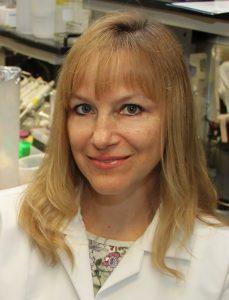
Karen M. Vasquez, Ph.D., who serves as the College of Pharmacy’s James T. Doluisio Regents Professor and Head of the Division of Pharmacology and Toxicology, recently collaborated on a research paper exploring the mechanisms involved in DNA structure-induced genetic instability in human disease. “Mechanisms of genetic instability caused by (CGG)n repeats in an experimental mammalian system” recently published in Nature, and includes co-authors Artem V. Kononenko, Thomas Ebersole, and Sergei M. Mirkin from Tufts University.
Dr. Vasquez’s group has frequently worked with Dr. Sergei Mirkin’s group from Tufts University, as both of laboratories are interested in understanding the mechanisms involved in DNA structure-induced genetic instability in human disease. The paper describes both labs studying a triplet repeat forming sequence that is capable of forming alternative DNA structures and is implicated in Fragile X syndrome. Dr. Mirkin and Dr. Vasquez had a collaborative APRC supplement grant several years ago, and this study is a result of that collaboration.
The labs created the first genetically-tractable system to study repeat-expansions in cultured mammalian cells. Specifically, they studied the instability of fragile X (CGG)n repeats that were placed upstream a reporter HyTK gene, which would be inactivated upon repeat expansions. Capitalizing on this genetic system, they discovered a unique mutational signature associated with repeat instability: a change in repeat length concurrent with mutagenesis in the adjacent reporter gene. Their candidate gene analysis using the RNA interference (siRNA) approach for gene inactivation revealed that this mutational signature occurs in the process of break-induced replication, which among other things, is responsible for the repair of collapsed replication forks. They propose that replication fork collapse at (CGG)n repeats triggers break-induced replication that leads to simultaneous repeat length changes and mutagenesis at a distance.
The research, and its publication in Nature, marks an excellent example of The University of Texas at Austin College of Pharmacy’s far-reaching collaborative work with other institutions, labs, and areas of research. Read more about Dr. Vasquez’s collaborate research in Nature.

